Contemporary Accounting Issue Analysis: Qantas Company and Banks' Fees
VerifiedAdded on 2021/01/02
|10
|2335
|304
Report
AI Summary
This report provides an executive summary and detailed analysis of contemporary accounting issues, particularly focusing on the Qantas Company and the misconduct within the Australian banking sector. It highlights the scandal where banks charged fees to deceased customers for financial advice that was never delivered, leading to significant public outrage and a royal commission investigation. The report examines the unethical practices, the impact on customer trust, and the implications for the banking industry's reputation. It explores the findings of the Qantas Company report, the role of social responsibility, and the need for stricter audit and assurance measures to prevent future misconduct. The report also provides recommendations for improved internal controls, social accounting practices, and external audits to enhance transparency and ethical behavior within financial institutions. The conclusion emphasizes the importance of social responsibility and ethical conduct in accounting, advocating for a shift towards prioritizing customers and society over profits.
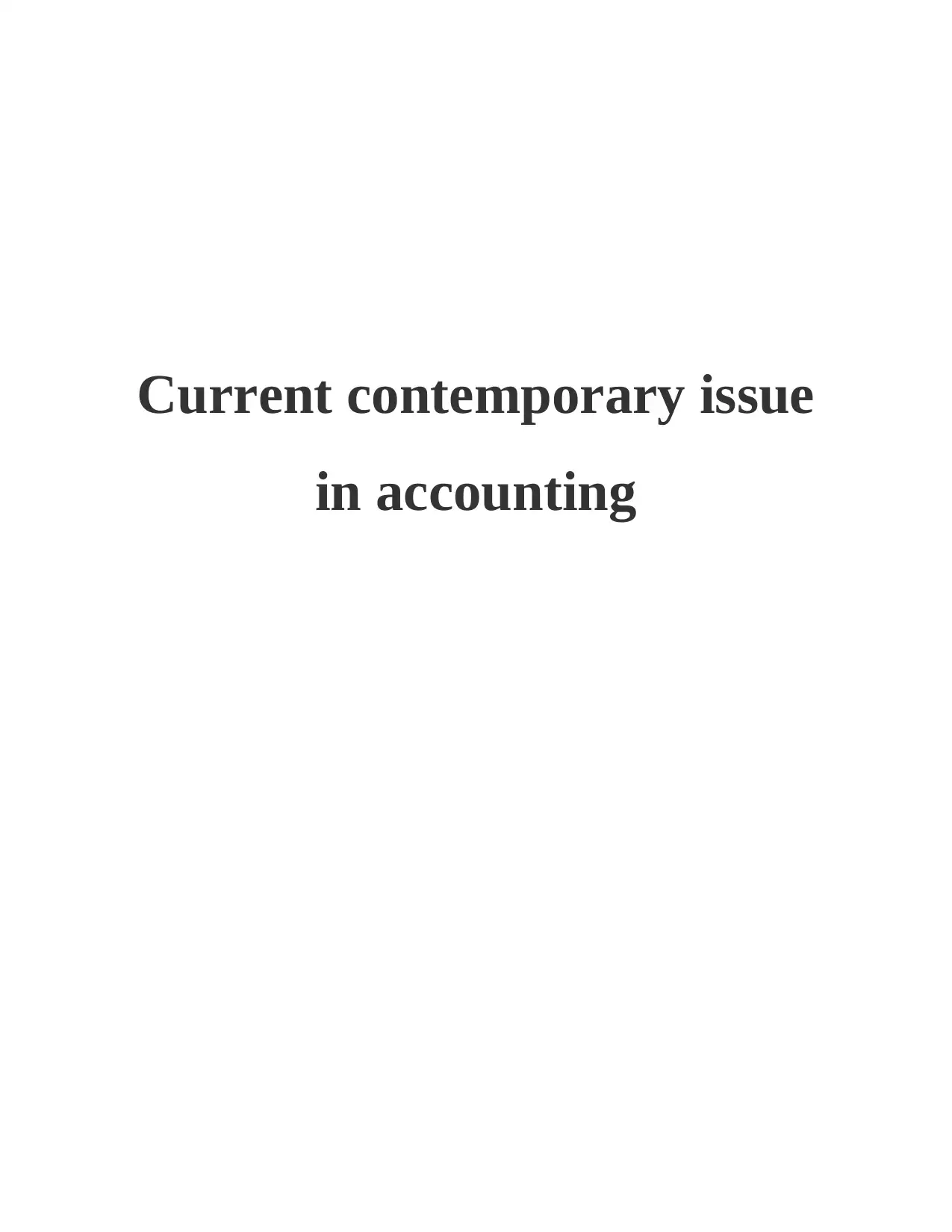
Current contemporary issue
in accounting
in accounting
Paraphrase This Document
Need a fresh take? Get an instant paraphrase of this document with our AI Paraphraser
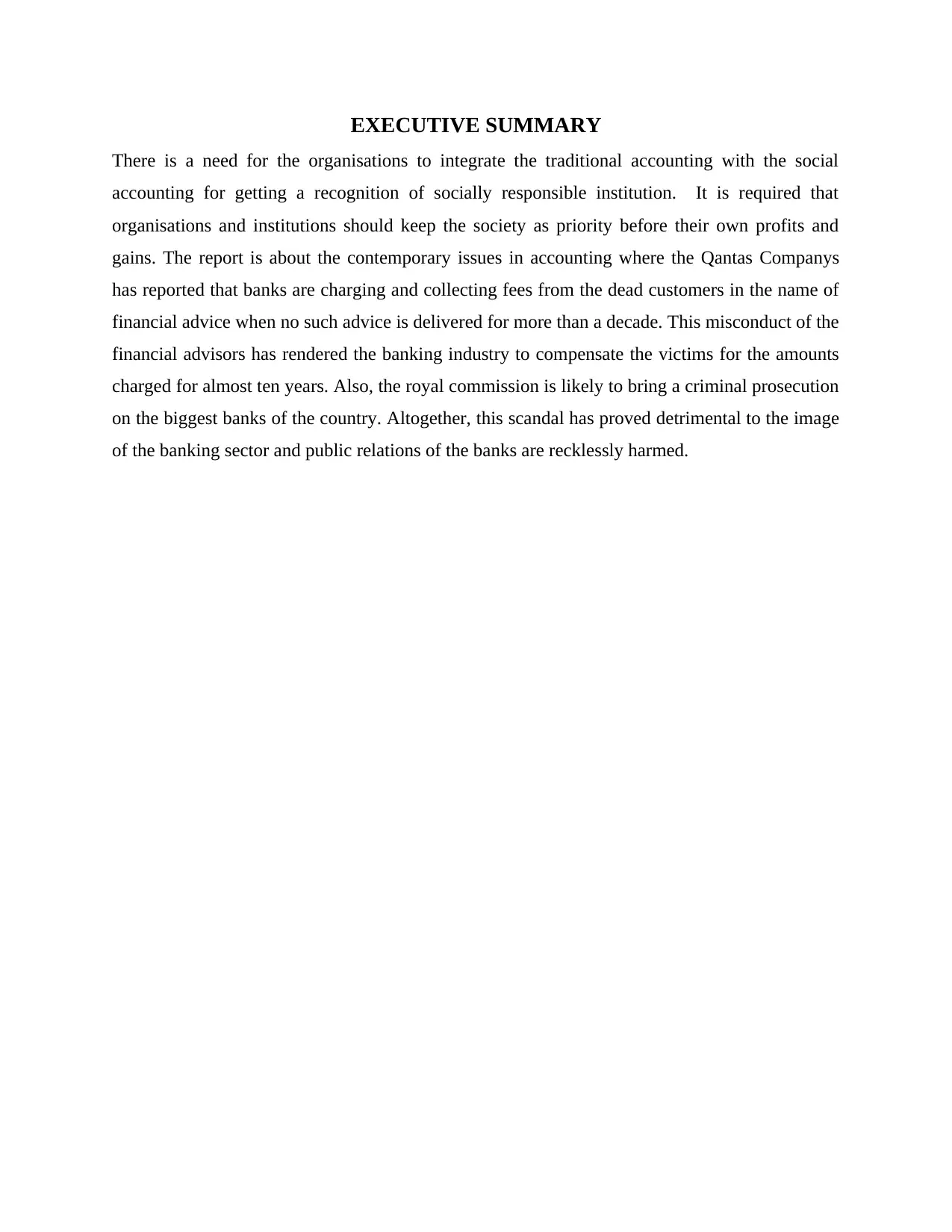
EXECUTIVE SUMMARY
There is a need for the organisations to integrate the traditional accounting with the social
accounting for getting a recognition of socially responsible institution. It is required that
organisations and institutions should keep the society as priority before their own profits and
gains. The report is about the contemporary issues in accounting where the Qantas Companys
has reported that banks are charging and collecting fees from the dead customers in the name of
financial advice when no such advice is delivered for more than a decade. This misconduct of the
financial advisors has rendered the banking industry to compensate the victims for the amounts
charged for almost ten years. Also, the royal commission is likely to bring a criminal prosecution
on the biggest banks of the country. Altogether, this scandal has proved detrimental to the image
of the banking sector and public relations of the banks are recklessly harmed.
There is a need for the organisations to integrate the traditional accounting with the social
accounting for getting a recognition of socially responsible institution. It is required that
organisations and institutions should keep the society as priority before their own profits and
gains. The report is about the contemporary issues in accounting where the Qantas Companys
has reported that banks are charging and collecting fees from the dead customers in the name of
financial advice when no such advice is delivered for more than a decade. This misconduct of the
financial advisors has rendered the banking industry to compensate the victims for the amounts
charged for almost ten years. Also, the royal commission is likely to bring a criminal prosecution
on the biggest banks of the country. Altogether, this scandal has proved detrimental to the image
of the banking sector and public relations of the banks are recklessly harmed.
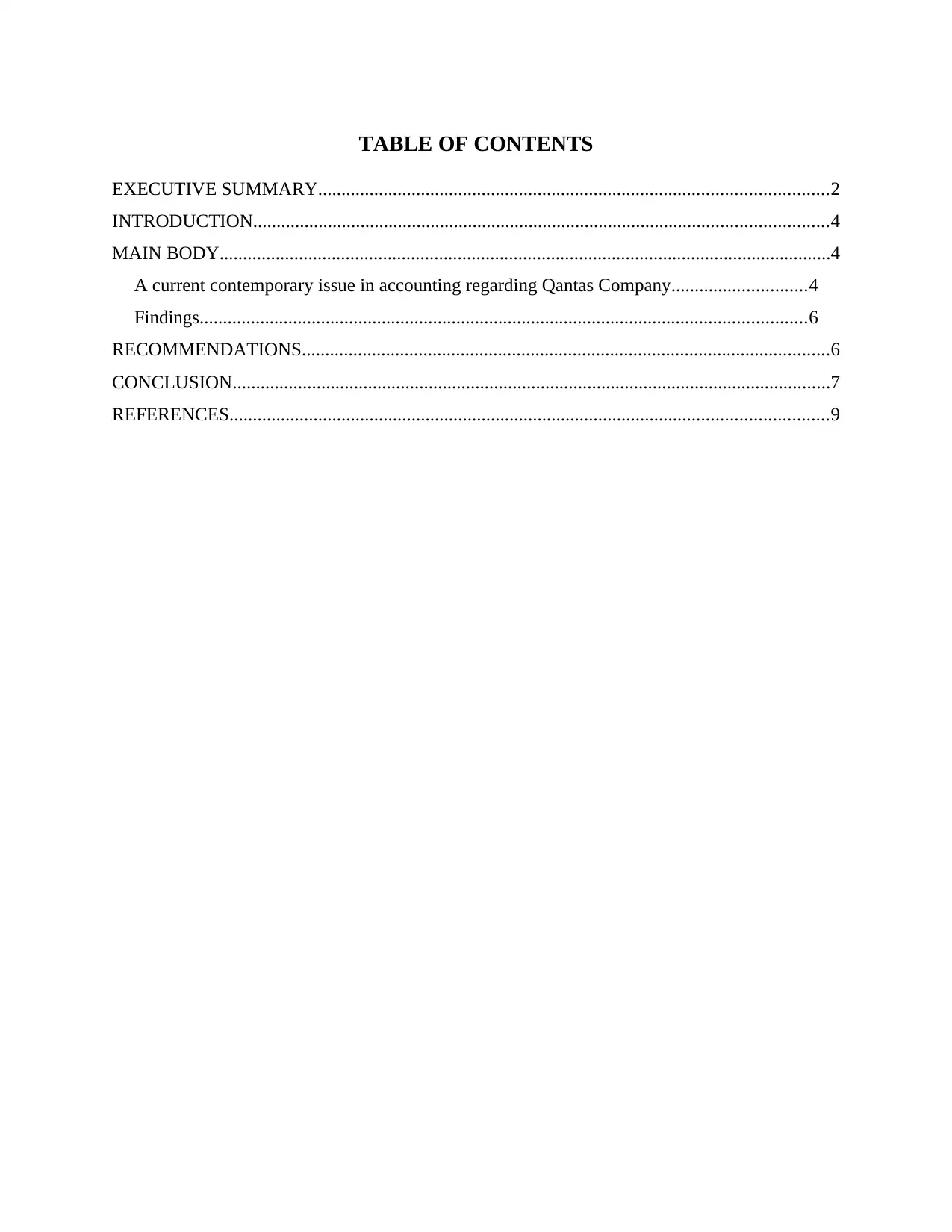
TABLE OF CONTENTS
EXECUTIVE SUMMARY.............................................................................................................2
INTRODUCTION...........................................................................................................................4
MAIN BODY...................................................................................................................................4
A current contemporary issue in accounting regarding Qantas Company.............................4
Findings..................................................................................................................................6
RECOMMENDATIONS.................................................................................................................6
CONCLUSION................................................................................................................................7
REFERENCES................................................................................................................................9
EXECUTIVE SUMMARY.............................................................................................................2
INTRODUCTION...........................................................................................................................4
MAIN BODY...................................................................................................................................4
A current contemporary issue in accounting regarding Qantas Company.............................4
Findings..................................................................................................................................6
RECOMMENDATIONS.................................................................................................................6
CONCLUSION................................................................................................................................7
REFERENCES................................................................................................................................9
⊘ This is a preview!⊘
Do you want full access?
Subscribe today to unlock all pages.

Trusted by 1+ million students worldwide
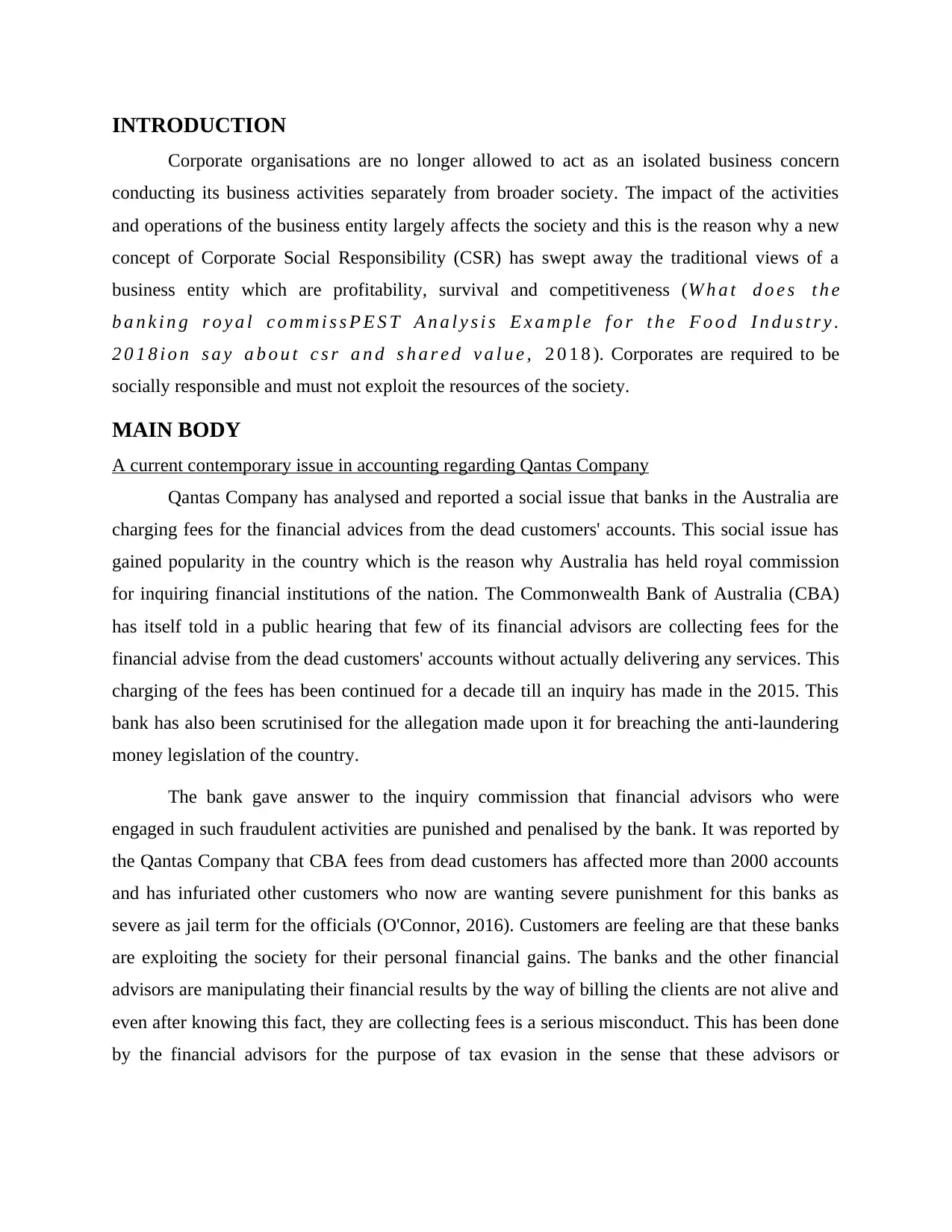
INTRODUCTION
Corporate organisations are no longer allowed to act as an isolated business concern
conducting its business activities separately from broader society. The impact of the activities
and operations of the business entity largely affects the society and this is the reason why a new
concept of Corporate Social Responsibility (CSR) has swept away the traditional views of a
business entity which are profitability, survival and competitiveness (W h a t d o e s t h e
b a n k i n g r o y a l c o m m i s s P E S T A n a l y s i s E x a m p l e f o r t h e F o o d I n d u s t r y .
2 0 1 8 i o n s a y a b o u t c s r a n d s h a r e d v a l u e , 2 0 1 8 ). Corporates are required to be
socially responsible and must not exploit the resources of the society.
MAIN BODY
A current contemporary issue in accounting regarding Qantas Company
Qantas Company has analysed and reported a social issue that banks in the Australia are
charging fees for the financial advices from the dead customers' accounts. This social issue has
gained popularity in the country which is the reason why Australia has held royal commission
for inquiring financial institutions of the nation. The Commonwealth Bank of Australia (CBA)
has itself told in a public hearing that few of its financial advisors are collecting fees for the
financial advise from the dead customers' accounts without actually delivering any services. This
charging of the fees has been continued for a decade till an inquiry has made in the 2015. This
bank has also been scrutinised for the allegation made upon it for breaching the anti-laundering
money legislation of the country.
The bank gave answer to the inquiry commission that financial advisors who were
engaged in such fraudulent activities are punished and penalised by the bank. It was reported by
the Qantas Company that CBA fees from dead customers has affected more than 2000 accounts
and has infuriated other customers who now are wanting severe punishment for this banks as
severe as jail term for the officials (O'Connor, 2016). Customers are feeling are that these banks
are exploiting the society for their personal financial gains. The banks and the other financial
advisors are manipulating their financial results by the way of billing the clients are not alive and
even after knowing this fact, they are collecting fees is a serious misconduct. This has been done
by the financial advisors for the purpose of tax evasion in the sense that these advisors or
Corporate organisations are no longer allowed to act as an isolated business concern
conducting its business activities separately from broader society. The impact of the activities
and operations of the business entity largely affects the society and this is the reason why a new
concept of Corporate Social Responsibility (CSR) has swept away the traditional views of a
business entity which are profitability, survival and competitiveness (W h a t d o e s t h e
b a n k i n g r o y a l c o m m i s s P E S T A n a l y s i s E x a m p l e f o r t h e F o o d I n d u s t r y .
2 0 1 8 i o n s a y a b o u t c s r a n d s h a r e d v a l u e , 2 0 1 8 ). Corporates are required to be
socially responsible and must not exploit the resources of the society.
MAIN BODY
A current contemporary issue in accounting regarding Qantas Company
Qantas Company has analysed and reported a social issue that banks in the Australia are
charging fees for the financial advices from the dead customers' accounts. This social issue has
gained popularity in the country which is the reason why Australia has held royal commission
for inquiring financial institutions of the nation. The Commonwealth Bank of Australia (CBA)
has itself told in a public hearing that few of its financial advisors are collecting fees for the
financial advise from the dead customers' accounts without actually delivering any services. This
charging of the fees has been continued for a decade till an inquiry has made in the 2015. This
bank has also been scrutinised for the allegation made upon it for breaching the anti-laundering
money legislation of the country.
The bank gave answer to the inquiry commission that financial advisors who were
engaged in such fraudulent activities are punished and penalised by the bank. It was reported by
the Qantas Company that CBA fees from dead customers has affected more than 2000 accounts
and has infuriated other customers who now are wanting severe punishment for this banks as
severe as jail term for the officials (O'Connor, 2016). Customers are feeling are that these banks
are exploiting the society for their personal financial gains. The banks and the other financial
advisors are manipulating their financial results by the way of billing the clients are not alive and
even after knowing this fact, they are collecting fees is a serious misconduct. This has been done
by the financial advisors for the purpose of tax evasion in the sense that these advisors or
Paraphrase This Document
Need a fresh take? Get an instant paraphrase of this document with our AI Paraphraser
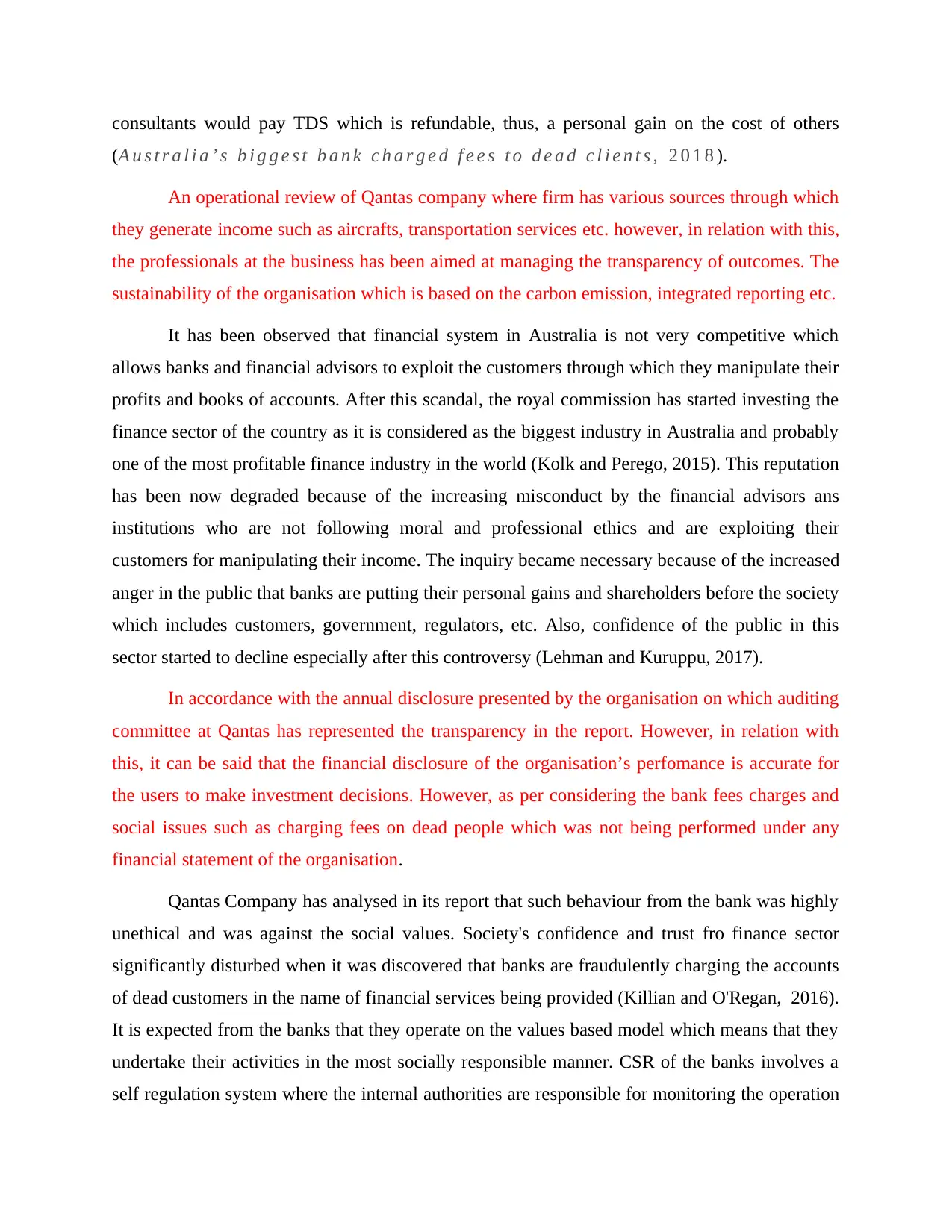
consultants would pay TDS which is refundable, thus, a personal gain on the cost of others
(A u s t r a l i a ’ s b i g g e s t b a n k c h a r g e d f e e s t o d e a d c l i e n t s , 2 0 1 8 ).
An operational review of Qantas company where firm has various sources through which
they generate income such as aircrafts, transportation services etc. however, in relation with this,
the professionals at the business has been aimed at managing the transparency of outcomes. The
sustainability of the organisation which is based on the carbon emission, integrated reporting etc.
It has been observed that financial system in Australia is not very competitive which
allows banks and financial advisors to exploit the customers through which they manipulate their
profits and books of accounts. After this scandal, the royal commission has started investing the
finance sector of the country as it is considered as the biggest industry in Australia and probably
one of the most profitable finance industry in the world (Kolk and Perego, 2015). This reputation
has been now degraded because of the increasing misconduct by the financial advisors ans
institutions who are not following moral and professional ethics and are exploiting their
customers for manipulating their income. The inquiry became necessary because of the increased
anger in the public that banks are putting their personal gains and shareholders before the society
which includes customers, government, regulators, etc. Also, confidence of the public in this
sector started to decline especially after this controversy (Lehman and Kuruppu, 2017).
In accordance with the annual disclosure presented by the organisation on which auditing
committee at Qantas has represented the transparency in the report. However, in relation with
this, it can be said that the financial disclosure of the organisation’s perfomance is accurate for
the users to make investment decisions. However, as per considering the bank fees charges and
social issues such as charging fees on dead people which was not being performed under any
financial statement of the organisation.
Qantas Company has analysed in its report that such behaviour from the bank was highly
unethical and was against the social values. Society's confidence and trust fro finance sector
significantly disturbed when it was discovered that banks are fraudulently charging the accounts
of dead customers in the name of financial services being provided (Killian and O'Regan, 2016).
It is expected from the banks that they operate on the values based model which means that they
undertake their activities in the most socially responsible manner. CSR of the banks involves a
self regulation system where the internal authorities are responsible for monitoring the operation
(A u s t r a l i a ’ s b i g g e s t b a n k c h a r g e d f e e s t o d e a d c l i e n t s , 2 0 1 8 ).
An operational review of Qantas company where firm has various sources through which
they generate income such as aircrafts, transportation services etc. however, in relation with this,
the professionals at the business has been aimed at managing the transparency of outcomes. The
sustainability of the organisation which is based on the carbon emission, integrated reporting etc.
It has been observed that financial system in Australia is not very competitive which
allows banks and financial advisors to exploit the customers through which they manipulate their
profits and books of accounts. After this scandal, the royal commission has started investing the
finance sector of the country as it is considered as the biggest industry in Australia and probably
one of the most profitable finance industry in the world (Kolk and Perego, 2015). This reputation
has been now degraded because of the increasing misconduct by the financial advisors ans
institutions who are not following moral and professional ethics and are exploiting their
customers for manipulating their income. The inquiry became necessary because of the increased
anger in the public that banks are putting their personal gains and shareholders before the society
which includes customers, government, regulators, etc. Also, confidence of the public in this
sector started to decline especially after this controversy (Lehman and Kuruppu, 2017).
In accordance with the annual disclosure presented by the organisation on which auditing
committee at Qantas has represented the transparency in the report. However, in relation with
this, it can be said that the financial disclosure of the organisation’s perfomance is accurate for
the users to make investment decisions. However, as per considering the bank fees charges and
social issues such as charging fees on dead people which was not being performed under any
financial statement of the organisation.
Qantas Company has analysed in its report that such behaviour from the bank was highly
unethical and was against the social values. Society's confidence and trust fro finance sector
significantly disturbed when it was discovered that banks are fraudulently charging the accounts
of dead customers in the name of financial services being provided (Killian and O'Regan, 2016).
It is expected from the banks that they operate on the values based model which means that they
undertake their activities in the most socially responsible manner. CSR of the banks involves a
self regulation system where the internal authorities are responsible for monitoring the operation
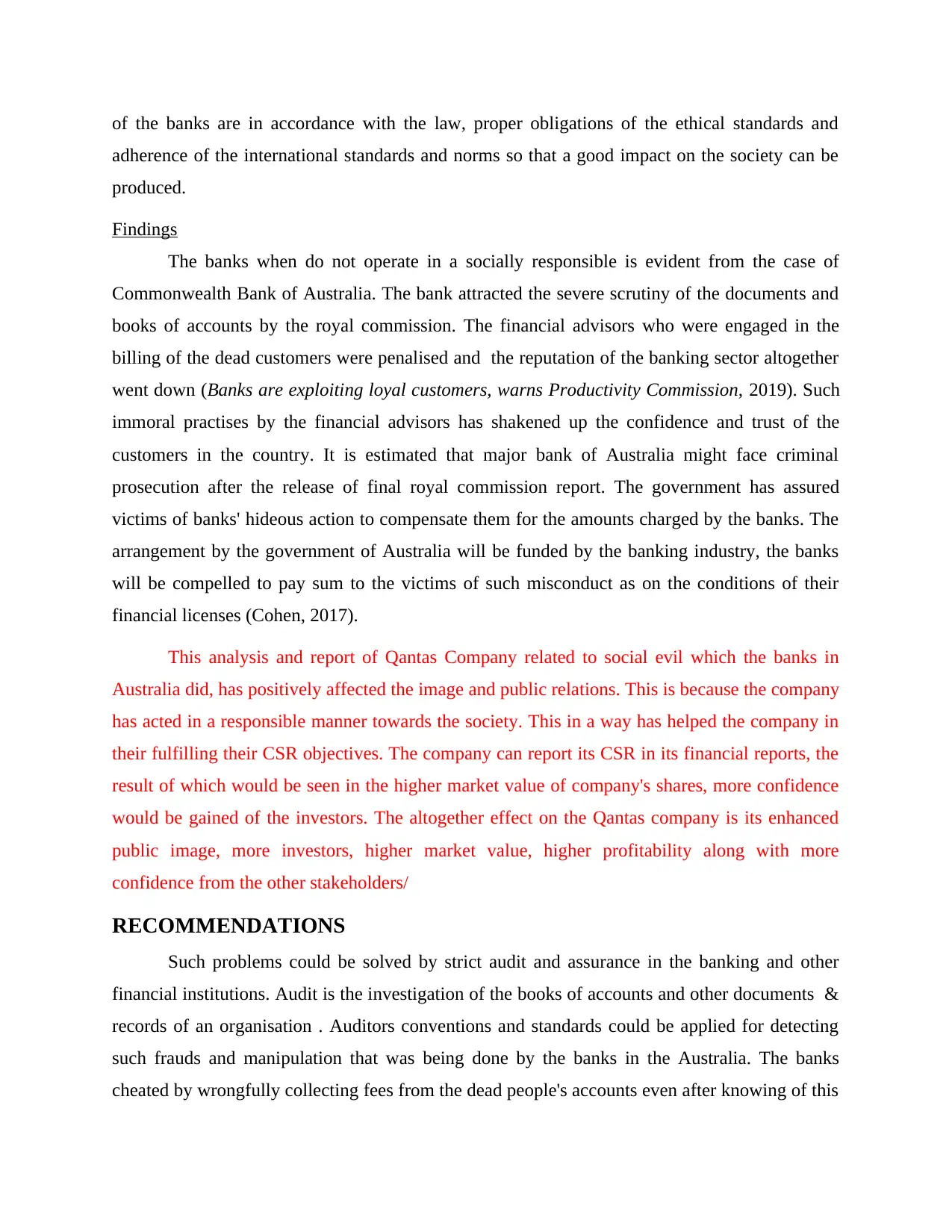
of the banks are in accordance with the law, proper obligations of the ethical standards and
adherence of the international standards and norms so that a good impact on the society can be
produced.
Findings
The banks when do not operate in a socially responsible is evident from the case of
Commonwealth Bank of Australia. The bank attracted the severe scrutiny of the documents and
books of accounts by the royal commission. The financial advisors who were engaged in the
billing of the dead customers were penalised and the reputation of the banking sector altogether
went down (Banks are exploiting loyal customers, warns Productivity Commission, 2019). Such
immoral practises by the financial advisors has shakened up the confidence and trust of the
customers in the country. It is estimated that major bank of Australia might face criminal
prosecution after the release of final royal commission report. The government has assured
victims of banks' hideous action to compensate them for the amounts charged by the banks. The
arrangement by the government of Australia will be funded by the banking industry, the banks
will be compelled to pay sum to the victims of such misconduct as on the conditions of their
financial licenses (Cohen, 2017).
This analysis and report of Qantas Company related to social evil which the banks in
Australia did, has positively affected the image and public relations. This is because the company
has acted in a responsible manner towards the society. This in a way has helped the company in
their fulfilling their CSR objectives. The company can report its CSR in its financial reports, the
result of which would be seen in the higher market value of company's shares, more confidence
would be gained of the investors. The altogether effect on the Qantas company is its enhanced
public image, more investors, higher market value, higher profitability along with more
confidence from the other stakeholders/
RECOMMENDATIONS
Such problems could be solved by strict audit and assurance in the banking and other
financial institutions. Audit is the investigation of the books of accounts and other documents &
records of an organisation . Auditors conventions and standards could be applied for detecting
such frauds and manipulation that was being done by the banks in the Australia. The banks
cheated by wrongfully collecting fees from the dead people's accounts even after knowing of this
adherence of the international standards and norms so that a good impact on the society can be
produced.
Findings
The banks when do not operate in a socially responsible is evident from the case of
Commonwealth Bank of Australia. The bank attracted the severe scrutiny of the documents and
books of accounts by the royal commission. The financial advisors who were engaged in the
billing of the dead customers were penalised and the reputation of the banking sector altogether
went down (Banks are exploiting loyal customers, warns Productivity Commission, 2019). Such
immoral practises by the financial advisors has shakened up the confidence and trust of the
customers in the country. It is estimated that major bank of Australia might face criminal
prosecution after the release of final royal commission report. The government has assured
victims of banks' hideous action to compensate them for the amounts charged by the banks. The
arrangement by the government of Australia will be funded by the banking industry, the banks
will be compelled to pay sum to the victims of such misconduct as on the conditions of their
financial licenses (Cohen, 2017).
This analysis and report of Qantas Company related to social evil which the banks in
Australia did, has positively affected the image and public relations. This is because the company
has acted in a responsible manner towards the society. This in a way has helped the company in
their fulfilling their CSR objectives. The company can report its CSR in its financial reports, the
result of which would be seen in the higher market value of company's shares, more confidence
would be gained of the investors. The altogether effect on the Qantas company is its enhanced
public image, more investors, higher market value, higher profitability along with more
confidence from the other stakeholders/
RECOMMENDATIONS
Such problems could be solved by strict audit and assurance in the banking and other
financial institutions. Audit is the investigation of the books of accounts and other documents &
records of an organisation . Auditors conventions and standards could be applied for detecting
such frauds and manipulation that was being done by the banks in the Australia. The banks
cheated by wrongfully collecting fees from the dead people's accounts even after knowing of this
⊘ This is a preview!⊘
Do you want full access?
Subscribe today to unlock all pages.

Trusted by 1+ million students worldwide
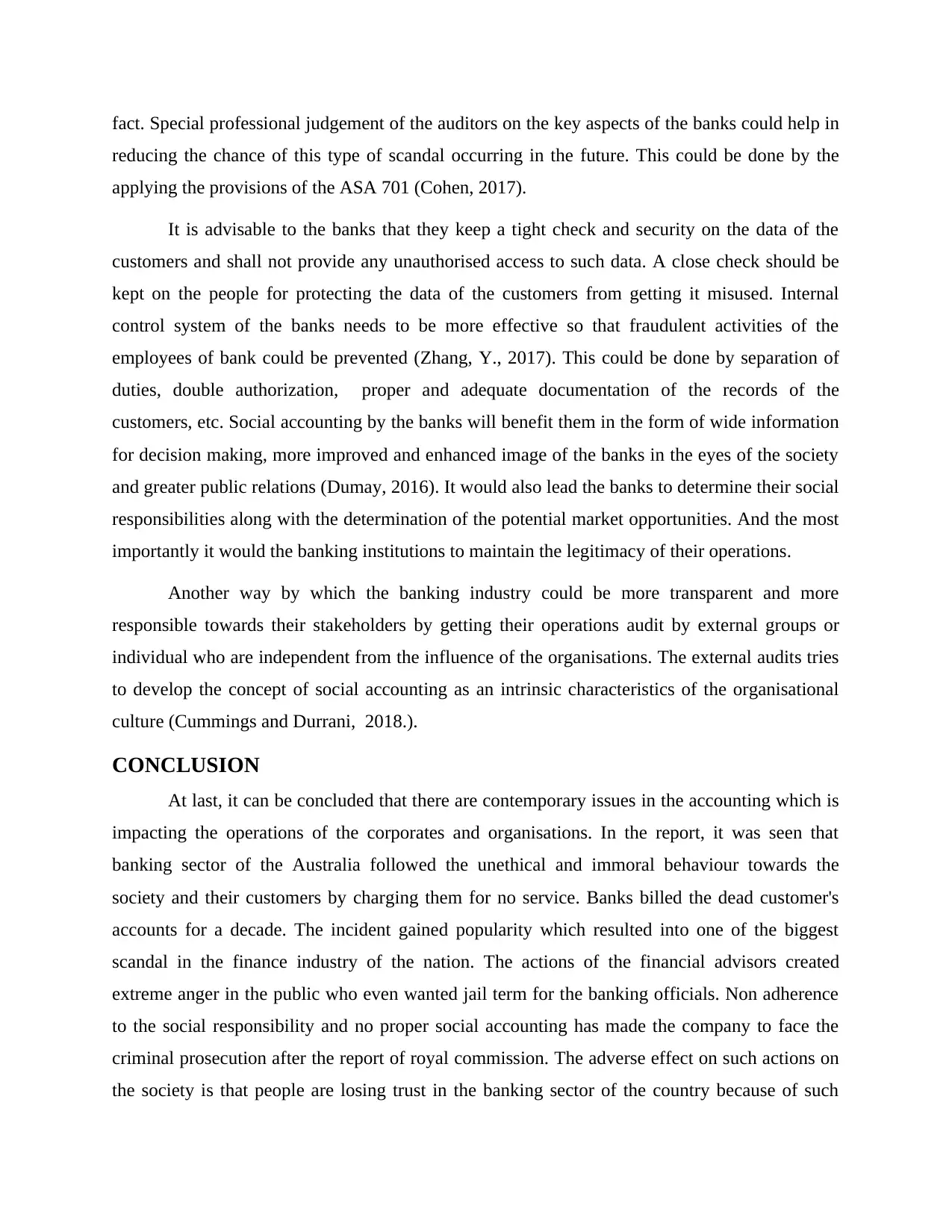
fact. Special professional judgement of the auditors on the key aspects of the banks could help in
reducing the chance of this type of scandal occurring in the future. This could be done by the
applying the provisions of the ASA 701 (Cohen, 2017).
It is advisable to the banks that they keep a tight check and security on the data of the
customers and shall not provide any unauthorised access to such data. A close check should be
kept on the people for protecting the data of the customers from getting it misused. Internal
control system of the banks needs to be more effective so that fraudulent activities of the
employees of bank could be prevented (Zhang, Y., 2017). This could be done by separation of
duties, double authorization, proper and adequate documentation of the records of the
customers, etc. Social accounting by the banks will benefit them in the form of wide information
for decision making, more improved and enhanced image of the banks in the eyes of the society
and greater public relations (Dumay, 2016). It would also lead the banks to determine their social
responsibilities along with the determination of the potential market opportunities. And the most
importantly it would the banking institutions to maintain the legitimacy of their operations.
Another way by which the banking industry could be more transparent and more
responsible towards their stakeholders by getting their operations audit by external groups or
individual who are independent from the influence of the organisations. The external audits tries
to develop the concept of social accounting as an intrinsic characteristics of the organisational
culture (Cummings and Durrani, 2018.).
CONCLUSION
At last, it can be concluded that there are contemporary issues in the accounting which is
impacting the operations of the corporates and organisations. In the report, it was seen that
banking sector of the Australia followed the unethical and immoral behaviour towards the
society and their customers by charging them for no service. Banks billed the dead customer's
accounts for a decade. The incident gained popularity which resulted into one of the biggest
scandal in the finance industry of the nation. The actions of the financial advisors created
extreme anger in the public who even wanted jail term for the banking officials. Non adherence
to the social responsibility and no proper social accounting has made the company to face the
criminal prosecution after the report of royal commission. The adverse effect on such actions on
the society is that people are losing trust in the banking sector of the country because of such
reducing the chance of this type of scandal occurring in the future. This could be done by the
applying the provisions of the ASA 701 (Cohen, 2017).
It is advisable to the banks that they keep a tight check and security on the data of the
customers and shall not provide any unauthorised access to such data. A close check should be
kept on the people for protecting the data of the customers from getting it misused. Internal
control system of the banks needs to be more effective so that fraudulent activities of the
employees of bank could be prevented (Zhang, Y., 2017). This could be done by separation of
duties, double authorization, proper and adequate documentation of the records of the
customers, etc. Social accounting by the banks will benefit them in the form of wide information
for decision making, more improved and enhanced image of the banks in the eyes of the society
and greater public relations (Dumay, 2016). It would also lead the banks to determine their social
responsibilities along with the determination of the potential market opportunities. And the most
importantly it would the banking institutions to maintain the legitimacy of their operations.
Another way by which the banking industry could be more transparent and more
responsible towards their stakeholders by getting their operations audit by external groups or
individual who are independent from the influence of the organisations. The external audits tries
to develop the concept of social accounting as an intrinsic characteristics of the organisational
culture (Cummings and Durrani, 2018.).
CONCLUSION
At last, it can be concluded that there are contemporary issues in the accounting which is
impacting the operations of the corporates and organisations. In the report, it was seen that
banking sector of the Australia followed the unethical and immoral behaviour towards the
society and their customers by charging them for no service. Banks billed the dead customer's
accounts for a decade. The incident gained popularity which resulted into one of the biggest
scandal in the finance industry of the nation. The actions of the financial advisors created
extreme anger in the public who even wanted jail term for the banking officials. Non adherence
to the social responsibility and no proper social accounting has made the company to face the
criminal prosecution after the report of royal commission. The adverse effect on such actions on
the society is that people are losing trust in the banking sector of the country because of such
Paraphrase This Document
Need a fresh take? Get an instant paraphrase of this document with our AI Paraphraser
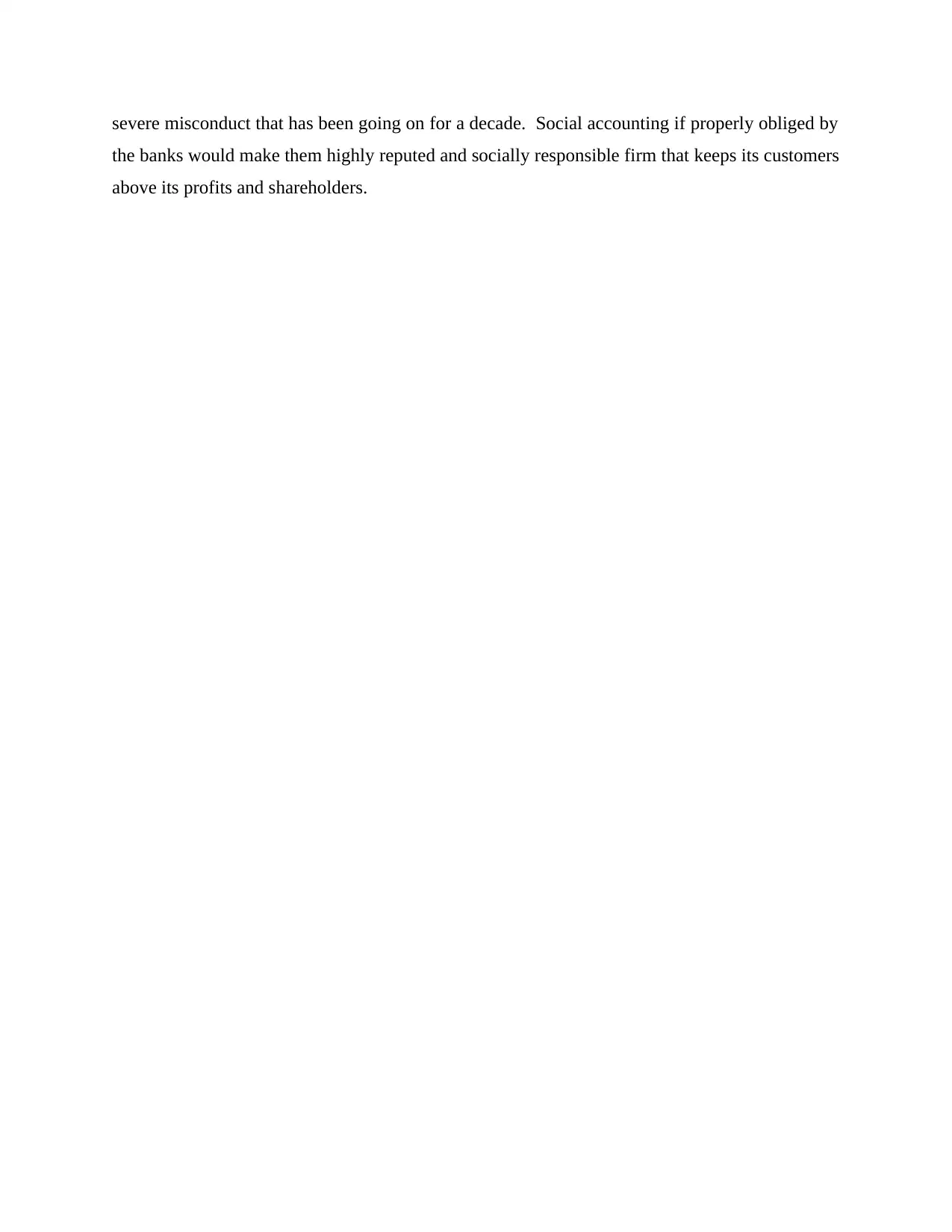
severe misconduct that has been going on for a decade. Social accounting if properly obliged by
the banks would make them highly reputed and socially responsible firm that keeps its customers
above its profits and shareholders.
the banks would make them highly reputed and socially responsible firm that keeps its customers
above its profits and shareholders.
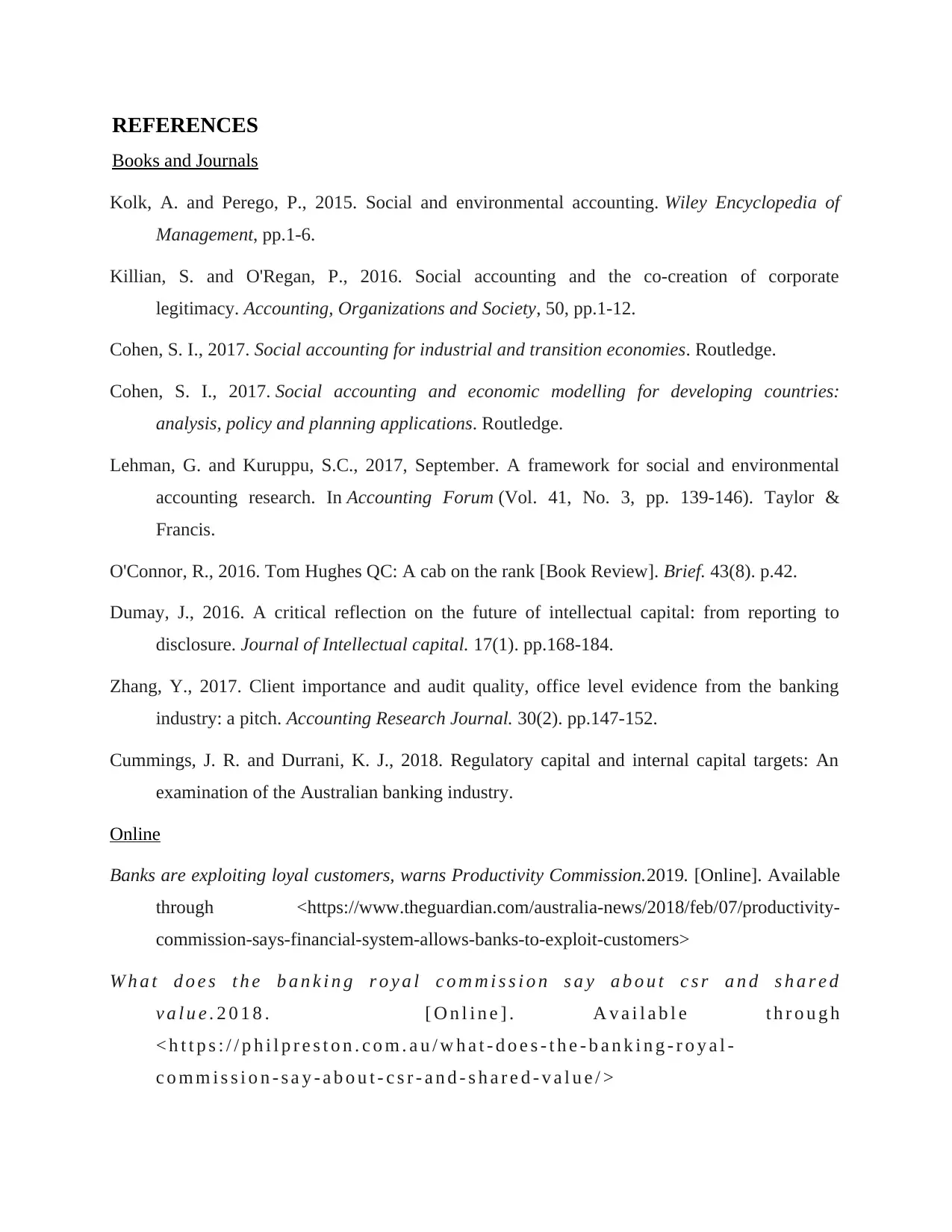
REFERENCES
Books and Journals
Kolk, A. and Perego, P., 2015. Social and environmental accounting. Wiley Encyclopedia of
Management, pp.1-6.
Killian, S. and O'Regan, P., 2016. Social accounting and the co-creation of corporate
legitimacy. Accounting, Organizations and Society, 50, pp.1-12.
Cohen, S. I., 2017. Social accounting for industrial and transition economies. Routledge.
Cohen, S. I., 2017. Social accounting and economic modelling for developing countries:
analysis, policy and planning applications. Routledge.
Lehman, G. and Kuruppu, S.C., 2017, September. A framework for social and environmental
accounting research. In Accounting Forum (Vol. 41, No. 3, pp. 139-146). Taylor &
Francis.
O'Connor, R., 2016. Tom Hughes QC: A cab on the rank [Book Review]. Brief. 43(8). p.42.
Dumay, J., 2016. A critical reflection on the future of intellectual capital: from reporting to
disclosure. Journal of Intellectual capital. 17(1). pp.168-184.
Zhang, Y., 2017. Client importance and audit quality, office level evidence from the banking
industry: a pitch. Accounting Research Journal. 30(2). pp.147-152.
Cummings, J. R. and Durrani, K. J., 2018. Regulatory capital and internal capital targets: An
examination of the Australian banking industry.
Online
Banks are exploiting loyal customers, warns Productivity Commission.2019. [Online]. Available
through <https://www.theguardian.com/australia-news/2018/feb/07/productivity-
commission-says-financial-system-allows-banks-to-exploit-customers>
W h a t d o e s t h e b a n k i n g r o y a l c o m m i s s i o n s a y a b o u t c s r a n d s h a r e d
v a l u e . 2 0 1 8 . [ O n l i n e ] . A v a i l a b l e t h r o u g h
< h t t p s : / / p h i l p r e s t o n . c o m . a u / w h a t - d o e s - t h e - b a n k i n g - r o y a l -
c o m m i s s i o n - s a y - a b o u t - c s r - a n d - s h a r e d - v a l u e / >
Books and Journals
Kolk, A. and Perego, P., 2015. Social and environmental accounting. Wiley Encyclopedia of
Management, pp.1-6.
Killian, S. and O'Regan, P., 2016. Social accounting and the co-creation of corporate
legitimacy. Accounting, Organizations and Society, 50, pp.1-12.
Cohen, S. I., 2017. Social accounting for industrial and transition economies. Routledge.
Cohen, S. I., 2017. Social accounting and economic modelling for developing countries:
analysis, policy and planning applications. Routledge.
Lehman, G. and Kuruppu, S.C., 2017, September. A framework for social and environmental
accounting research. In Accounting Forum (Vol. 41, No. 3, pp. 139-146). Taylor &
Francis.
O'Connor, R., 2016. Tom Hughes QC: A cab on the rank [Book Review]. Brief. 43(8). p.42.
Dumay, J., 2016. A critical reflection on the future of intellectual capital: from reporting to
disclosure. Journal of Intellectual capital. 17(1). pp.168-184.
Zhang, Y., 2017. Client importance and audit quality, office level evidence from the banking
industry: a pitch. Accounting Research Journal. 30(2). pp.147-152.
Cummings, J. R. and Durrani, K. J., 2018. Regulatory capital and internal capital targets: An
examination of the Australian banking industry.
Online
Banks are exploiting loyal customers, warns Productivity Commission.2019. [Online]. Available
through <https://www.theguardian.com/australia-news/2018/feb/07/productivity-
commission-says-financial-system-allows-banks-to-exploit-customers>
W h a t d o e s t h e b a n k i n g r o y a l c o m m i s s i o n s a y a b o u t c s r a n d s h a r e d
v a l u e . 2 0 1 8 . [ O n l i n e ] . A v a i l a b l e t h r o u g h
< h t t p s : / / p h i l p r e s t o n . c o m . a u / w h a t - d o e s - t h e - b a n k i n g - r o y a l -
c o m m i s s i o n - s a y - a b o u t - c s r - a n d - s h a r e d - v a l u e / >
⊘ This is a preview!⊘
Do you want full access?
Subscribe today to unlock all pages.

Trusted by 1+ million students worldwide
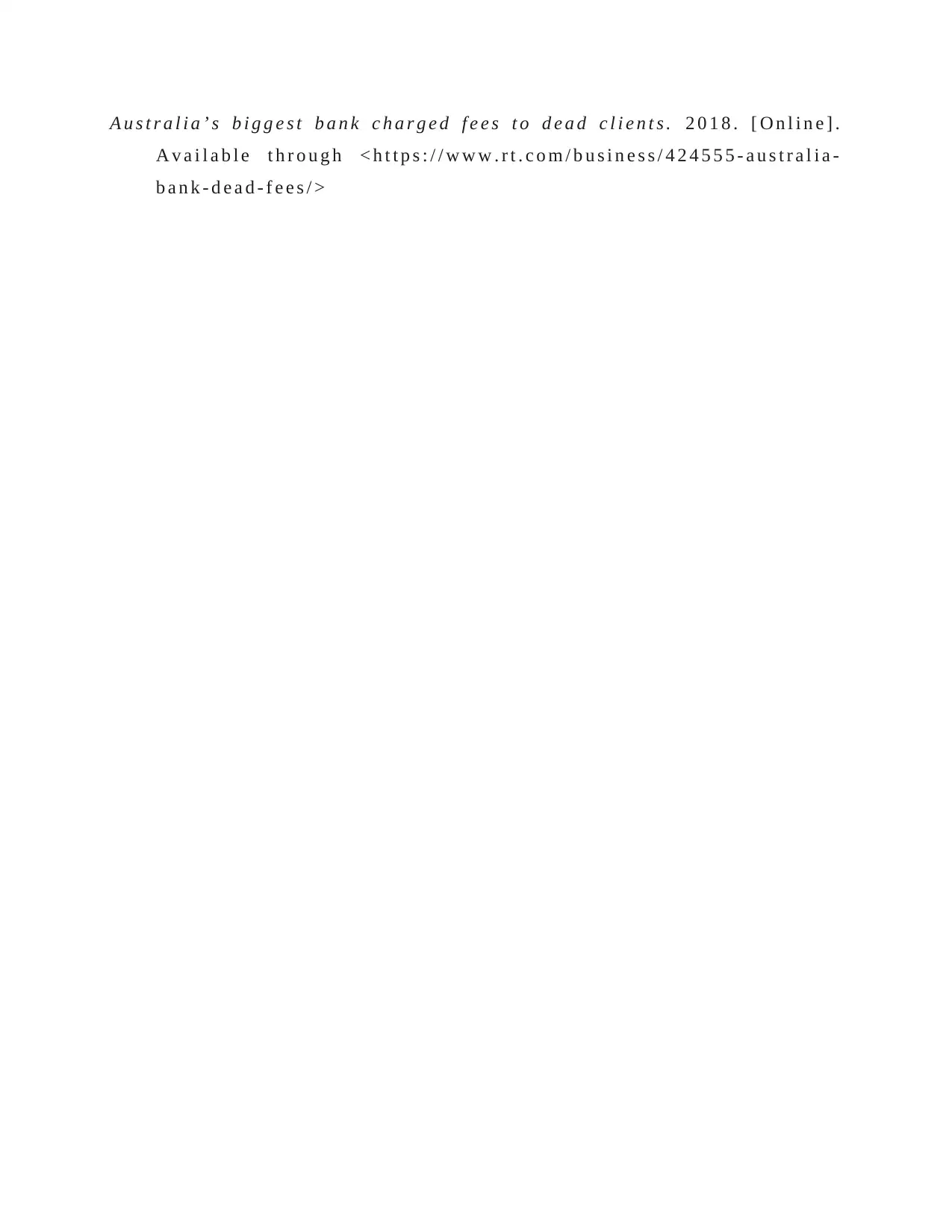
A u s t r a l i a ’ s b i g g e s t b a n k c h a r g e d f e e s t o d e a d c l i e n t s . 2 0 1 8 . [ O n l i n e ] .
A v a i l a b l e t h r o u g h < h t t p s : / / w w w . r t . c o m / b u s i n e s s / 4 2 4 5 5 5 - a u s t r a l i a -
b a n k - d e a d - f e e s / >
A v a i l a b l e t h r o u g h < h t t p s : / / w w w . r t . c o m / b u s i n e s s / 4 2 4 5 5 5 - a u s t r a l i a -
b a n k - d e a d - f e e s / >
1 out of 10
Related Documents
Your All-in-One AI-Powered Toolkit for Academic Success.
+13062052269
info@desklib.com
Available 24*7 on WhatsApp / Email
![[object Object]](/_next/static/media/star-bottom.7253800d.svg)
Unlock your academic potential
Copyright © 2020–2026 A2Z Services. All Rights Reserved. Developed and managed by ZUCOL.




